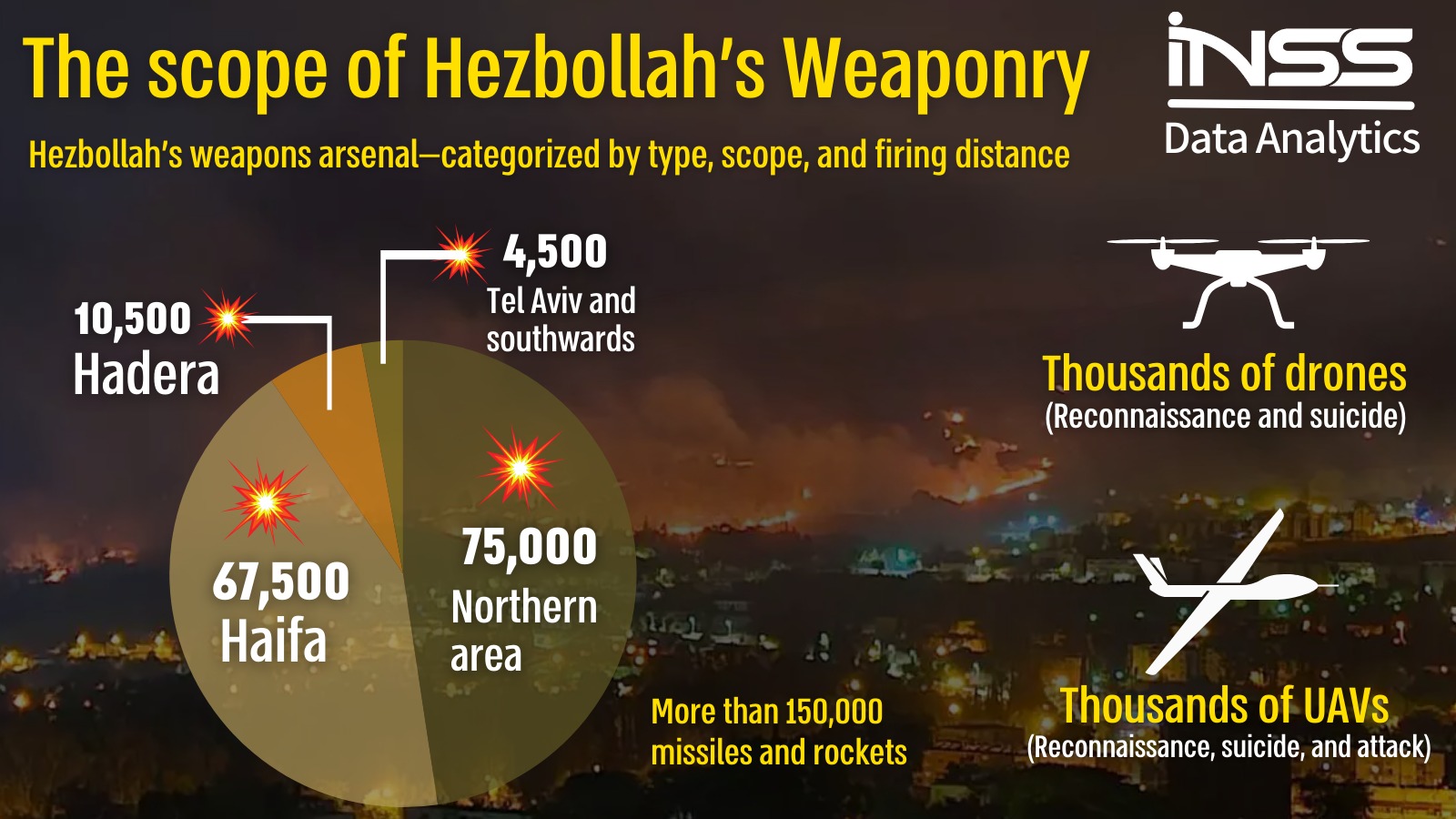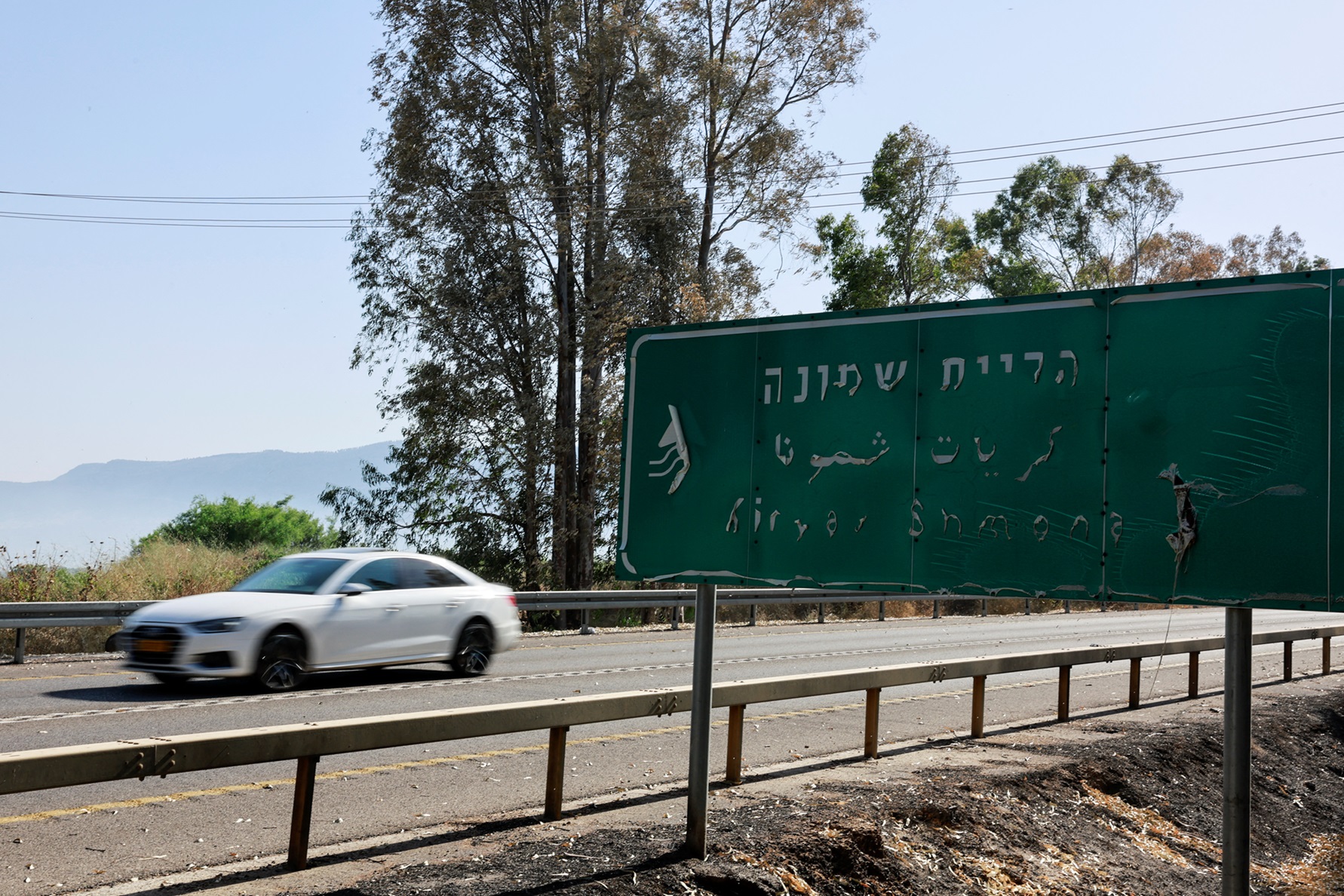Publications
INSS Insight No. 1872, July 7, 2024
Recently, the public discourse has been heavily focused on the possibility of a comprehensive war with Hezbollah. This article focuses on the severe damages expected in such a war to Israel’s civilian home front and its functional continuity, and consequently to the resilience of Israeli society and its ability to recover from the war. The analysis puts forward the need to carefully consider the risks posed by such a war to the civilian sphere, especially as long as the war in the Gaza Strip continues.
This article aims to assess the extent of potential damages to Israel’s civilian home front in a high-intensity, comprehensive war with Hezbollah, which is likely to become multi-front with the participation of all members of the “Resistance Axis.” This evaluation focuses on the impact on national resilience without addressing the overall military and political considerations. Such an analysis heavily depends on the features of such a war, who initiates or causes it, its duration, its territorial scope, the damage to the civilian population and its physical assets, Israel’s strategic objectives, and the war’s outcomes. A war to remove the Hezbollah threat is likely to be long and have severe consequences for Israel’s population and critical infrastructure.
The day after Hamas’s onslaught on October 7, 2023, Hezbollah started its ongoing war of attrition against Israel. It paused only during the Gaza ceasefire last November, which entailed the release of Israeli hostages. The campaign in the north is characterized by varying degrees of intensity—still limited in scope but representing a trend of escalation. However, both sides have deliberately avoided actions that would lead to a full-scale war. Other members of the Tehran-led “Resistance Axis” are also involved in the fighting against Israel.
Recently, following the assassination of senior Hezbollah figure “Abu Taleb” on June 12, the organization responded with unprecedented salvos, including hundreds of rockets and UAVs launched primarily toward military targets in the country’s north. Another round started after a similar Israeli targeted killing in early July, followed again by a large-scale Hezbollah high-trajectory response. Consequently, public appeals have increasingly called for initiating an extensive military offensive against Hezbollah to remove the threat from the north and allow more than 60,000 evacuees to return home safely. The IDF has also echoed such themes.
So far, Hezbollah has launched more than 5,000 high-trajectory and direct-fire projectiles toward civilian and military targets in Israel, causing 29 civilian and military fatalities and considerable damage. Above all, there is a growing sense of futility regarding the future of the northern border, the 28 evacuated localities and the city of Kiryat Shmona, with residents wondering when and under what conditions they will be able to return home.
Hezbollah—the spearhead of Iran’s “Resistance Axis”—has become the main military threat to Israel since the Second Lebanon War (2006), given its dramatic buildup through massive Iranian assistance. Hezbollah’s main arsenal consists of at least 150,000 missiles, rockets, and other lethal weapons, including hundreds of precision-guided medium- and long-range missiles, covering Israel’s entire populated areas. These include cruise missiles, ballistic missiles, advanced coastal anti-ship missiles, thousands of UAVs and other drones, and precise short-range anti-tank missiles. Together with advanced cyber systems, this broad and diverse arsenal can cause massive fatalities and critical national infrastructure destruction to civilian and military targets in Israel. Hezbollah’s military resources are quantitatively and qualitatively much greater than Hamas’s prewar military capabilities. The strategic implication is that Hezbollah has the military capabilities to conduct an exceedingly protracted war, probably lasting many months, and cause severe damage to Israel.

In a full-scale war with Hezbollah, the IDF’s air defense systems will have to deal over time—particularly during the initial few weeks of the war—with vast barrages of up to thousands of projectiles per day, not all of which can be intercepted. These barrages, including those from other fronts such as Iran, Iraq, Syria, and Yemen, could overwhelm the layers of Israeli air defenses and possibly lead to a shortage of interception ammunition. All this represents a military and civilian threat that Israel has never experienced. In such a scenario, the IDF will need to prioritize among different potential Israeli targets and allocate its resources for the most effective defense. The Air Force is likely to give top priority to the defense of critical military assets such as air force bases, second priority to essential national infrastructure, and only third priority to the civilian population. Public compliance with Home Front Command alerts and the use of passive protection (shelters of various kinds), which are in short supply, will be crucial for civilian protection.
Protecting critical national infrastructure is vital for maintaining the functional continuity required in both civilian and military spheres during emergencies. This includes sensitive systems such as the power grid, communications, land, sea, and air transportation networks, and supply chains from abroad and within the country. Disruptions to power supply could result from direct hits to production, transportation, and transmission facilities, as well as threats to natural gas production platforms. The latter might be hit or shut down for safety reasons, potentially leading to local and national power shortages. This would have severe consequences on functional continuity, the national economy, and the daily lives of Israel’s citizens.
Minimal civilian functional continuity during wartime is crucial for preserving national resilience, which is the primary platform for ensuring effective civilian coping mechanisms at the national, community, and individual levels. The risks posed by a multi-front war, particularly if it occurs simultaneously with the ongoing war in Gaza, present severe challenges to the civilian ecosystem in Israel and significant obstacles to recovery from the war, both physically and mentally.
Israel is still suffering from an ongoing collective trauma caused by the horrific events of last October 7 and the nine months of the war, severely affecting its resilience. This is reflected in data showing declining resilience, as demonstrated by public opinion polls conducted by INSS and others. Recent INSS polls indicate a significant decline in the national resilience of Israeli society compared to the initial months of the war. This decline is evidenced by a marked decrease in perceived solidarity, trust in state institutions—including the IDF—and the level of optimism and hope among most of the public. It is also affected by the perceived “stalemate” in the war in Gaza, especially amid deepening social rifts, splitting political disagreements, and toxic public discourse. After many months of war in Gaza, which most Israelis initially perceived as a justified war and led to a “rallying around the national flag,” doubts are now emerging as to the mental preparedness of Israeli society for a challenging and prolonged war in the north as well.
Among the country’s citizens, fewer than 10 percent have experienced severe disruption to their functional continuity at different levels, mainly families of the deceased and the hostages, the physically and mentally injured, evacuees from the south and north, and families of reservist soldiers. The rest are functioning—albeit under considerable psychological stress—in a usual manner. This is likely to contribute to recovery after the war in Gaza ends. In contrast, in a prolonged multi-front war against Hezbollah and its allies, the disruption to functional continuity is likely to affect many more Israelis. This will have severe implications for the recovery capacity of the civilian home front and the length of the expected recovery phase, which could extend for years. This scenario presents challenging implications for Israel’s national resilience, particularly as harsh domestic socio-political disruptions worsen despite the ongoing war.
Conclusion and Recommendations
Almost nine months into the war in Gaza, along with the ongoing limited war of attrition against Hezbollah, the discourse in Israel about the need to find a military solution to the strategic challenge posed by Hezbollah and to restore normalcy to the northern border communities is intensifying. Any consideration regarding the decision on whether, when, how, and under what circumstances Israel should engage in a war with Hezbollah, and possibly in a multi-front war against Iran and its other proxies, should take into account the expected short- and long-term costs to the civilian home front. As part of the considerations of how Israel should act in response to the threat from the north, particular weight should be given to a prudent assessment of the impact on Israeli national resilience, especially in the context of the long and exhausting months of the war in Gaza.
Under these circumstances, we propose the following:
- In any decision made in Israel regarding the expansion of the war in the north, serious consideration should be given to the current public atmosphere in Israel, the toxic public and political debate, including about the future of the war in Gaza, and the apparent decline in Israel's resilience. It is essential to take into account Israeli public opinion and the level of public consent regarding such a war and its goals.
- As long as the war in Gaza continues, Israel should avoid being drawn into a high-intensity multi-front war and should carefully consider the appropriate timing for such a grave eventuality. Naturally, if Hezbollah initiates or clearly causes a major escalation, Israel must respond in a measured and proportionate manner.
- As an alternative scenario, a prolonged ceasefire in the Gaza Strip, the release of the hostages, and consideration of a regional reconstruction based on the Biden framework could potentially allow for a ceasefire in the north and the opportunity for a diplomatic settlement there, with international mediation.
- If a comprehensive war with Hezbollah does break out, Israel should strive to shape it to be short in duration and territorially confined as much as possible, aiming to cause minimal material and moral damage to the Israeli home front.
- Given the high risks of the war scenario, the various governmental and security systems responsible for the functioning of the home front should optimize their preparedness and close existing gaps as soon as possible.
- In any case, there should be significant coordination of expectations with the public regarding the purpose and required achievements of the war, as well as the expected risks and necessary preparations of the civilian population. So far, no steps have been taken to prepare the public for this severe scenario.



